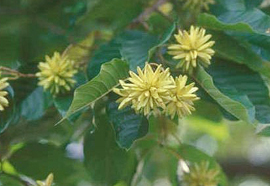more>>More News
- Year of the Rooster hosts two versions of 'Start o...
- Spring Festival in China

- Culture Insider: A compact history of women's powd...
- Traditional Chinese Medicine(TCM)
- The 24 Solar Terms
- THE GREAT WALL
- Mid-Autumn Day
- Chinese Ancient Garment
- DOUBLE SEVENTH FESTIVAL
- Chinese traditional dramas hit the big screen in H...

"Happy tree" yields a cancer-fighting drug
By admin on 2014-12-12
Vancouver Sun - B.C. cancer patients who
don’t get better on standard treatment will be offered a locally developed
experimental drug using a nanotechnology smart bomb type of treatment derived
from the bark of the “happy tree,” indigenous to China.
Scientists at the B.C. Cancer Agency (Vancouver, Canada) have developed an anti-cancer weapon that is not unlike a cruise missile, which is meant to hit targets with precision. It’s been tested in mice and they say it’s now ready for testing in humans.
They are calling their drug
Irinophore C; its compounds are originally derived from a somewhat stubby tree
called Camptotheca (or happy tree), which was found 40 years ago to have
anti-cancer properties that were eventually extracted and
synthesized.
While at least one drug company markets a chemotherapy drug called Camptosar, based on the same tree compounds, B.C. Cancer Agency scientists maintain they have discovered a unique way to get a modified version into patients’ bodies using a drug delivery system that doesn’t release its load until it gets to the desired site of action.
As the scientists discuss in a research journal, their own patented formula fits with the goal of an “ideal drug delivery system [which retains] its therapeutic payload until it reaches the target site whereupon the drug [is] released.”
Dawn Waterhouse, director of non-clinicial studies and manager of production and manufacturing with the cancer agency’s investigational drug program, said in an interview that in mice studies, the Irinophore C drug system was “remarkably better in therapeutic effect and less toxic” when compared to Camptosar.
Animals were inoculated with human tumour cells from various types of cancer and then they got Camptosar or Irinophore C for treatment of the tumours they developed.
The cancer agency-developed drug accumulated in the tumours with far greater efficiency and that convinced the scientists that a phase-one trial in humans is now possible. A phase-one trial is meant to evaluate the safety of the drug, not the effectiveness.
Such a trial is not expected to start immediately since researchers need to get more grant funding before proceeding. Work so far on the “proof of principle” concept has been funded with a $250,000 grant from the Canadian Institutes for health research but that federal agency insists that matching funds be obtained from other partners. Scientists are now trying to secure at least another $1.1 million to start the trial in patients with various types of advanced cancers.
What’s unusual about the drug is that it is encapsulated in a fatty coating membrane called liposomes.
The nanoscale technology aspect of the system relates to the fact that the fat molecules are so microscopically tiny (one-fifth the size of a red blood cell), which allows the drug to be infused into patients’ veins and then travel to cancer sells where it kills them and also disrupts the vascular system that feeds the growth of tumours.
“In our phase-one trial, we will
assess the safety of the drug in 18 patients with advanced solid
tumours.
“Patients will be those who have
failed standard therapy and their cancer has progressed. These are patients for
whom we have nothing more to offer except for investigational drugs,” Waterhouse
said.
- Contact Us
-
Tel:
0086-571-88165708
0086-571-88165512E-mail:
admission@cuecc.com
- About Us
- Who We Are What we do Why CUECC How to Apply
- Address
- Study in China TESOL in China
Hangzhou Jiaoyu Science and Technology Co.LTD.
Copyright 2003-2024, All rights reserved





 Chinese
Chinese
 English
English
 Korean
Korean
 Japanese
Japanese
 French
French
 Russian
Russian
 Vietnamese
Vietnamese
